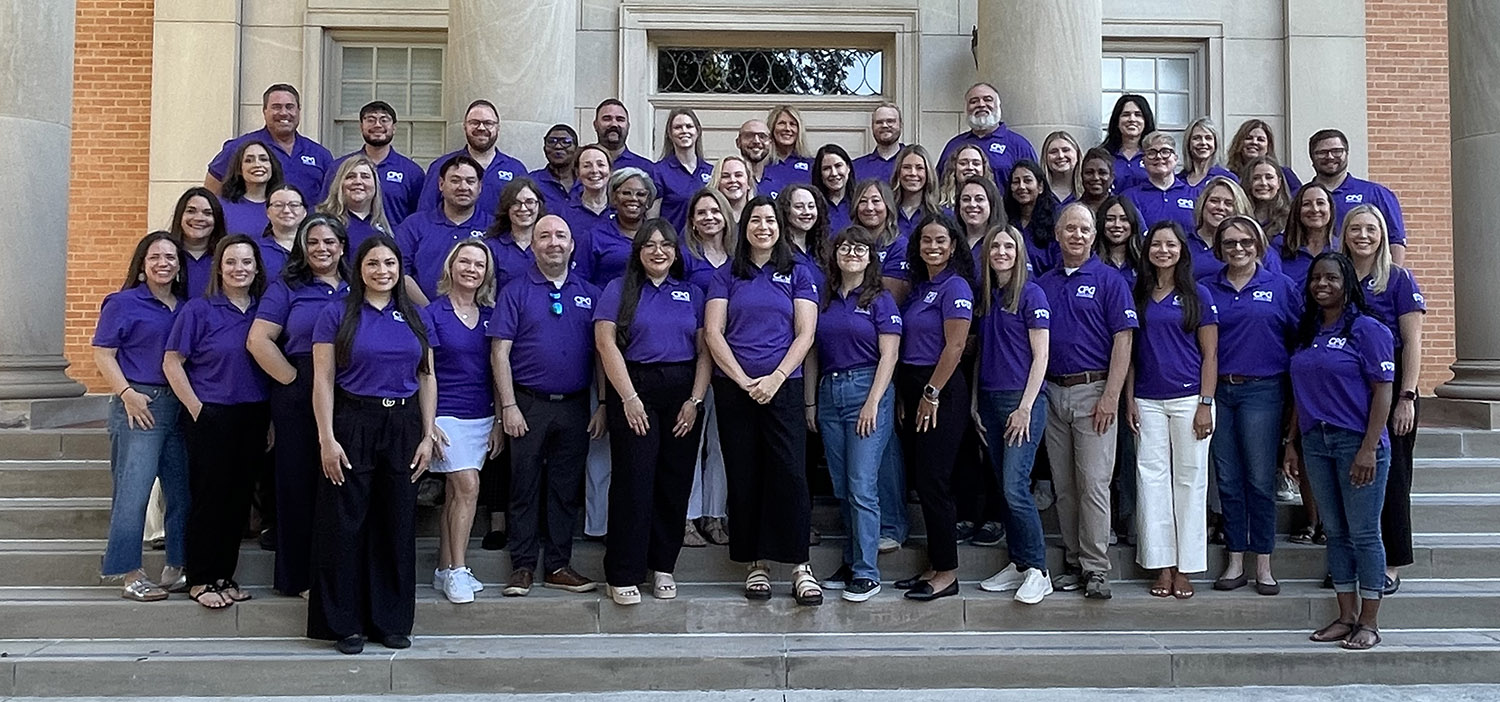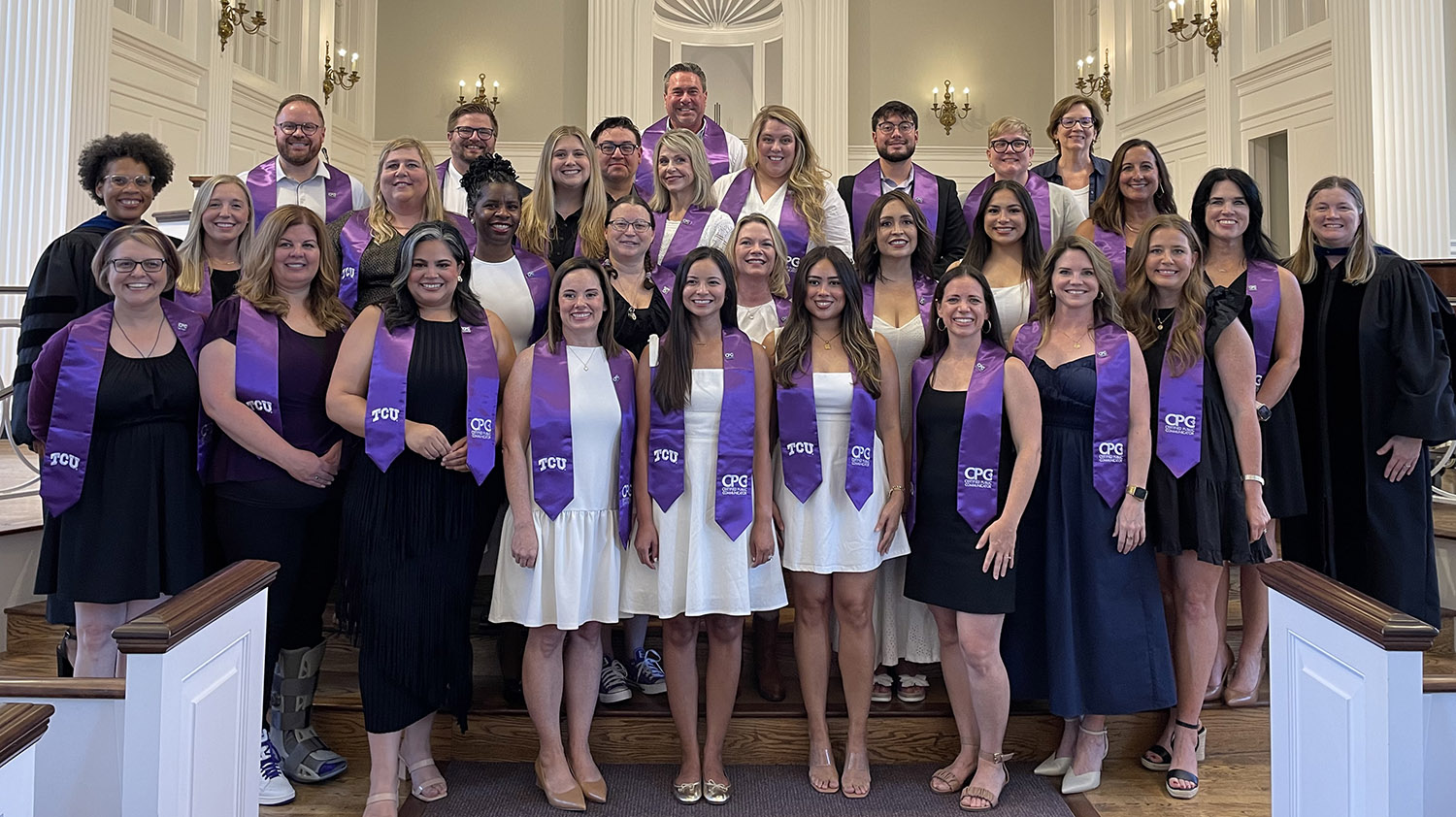
Students from two CPC cohorts in the summer 2025.
For the past 13 summers, public communicators from cities, counties, school districts and other government entities spend a week at TCU honing their communication skills as part of the Certified Public Communicator® program.
These students brave the Texas heat and enjoy the campus between sessions about leadership, engaging their communities and ethical communication.

Dr. Ashley English, strategic communication associate professor. and Tamara Jenkins, public information manager for City of Richmond, Virginia, at the CPC graduation ceremony.
“What better way to amplify community engagement than by inspiring those who do this in their jobs in every local government office every day,” said Dr. Ashley English, a long-time CPC faculty member and associate professor in the Department of Strategic Communication.
This one-of-a-kind professional development for communicators was the brainchild of Dr. Jacque Lambiase, strategic communication professor emerita, who recognized a lack of such opportunities for public sector communicators.
“Every department of local government seemed to have a certified this or that, except for communicators,” Lambiase said. “The role of communication in local government is essential, and these professionals deserve specialized professional development. Their roles in our communities are paramount.”
For two summers and one winter session, the students—organized in cohorts—meet at Moudy South for a week of instruction on complex topics including crisis communication, listening, social media policy, leadership and data analysis. Their goal? To earn their Certified Public Communicator® (CPC) designation and create a three-year communication plan for their city, county or school district.
This summer, 25 public-sector communicators from around the country received their designation as certified public communicators. They donned purple stoles (and many found purple footwear) for their commencement ceremony in the Robert Carr Chapel. They join more than 300 CPC graduates from the first 11 cohorts.
“Each cohort has its own identity, but a common thread is how strongly they connect with TCU and Fort Worth,” Lambiase said. “They hit the bookstore for their TCU garb, discover Fort Worth gems, visit the Stockyards, and their families and coworkers attend graduation. They are proud of their TCU ties and become ambassadors for CPC and TCU.”

Twenty-five graduates from cohort 12, plus three candidates for graduation later this year, celebrated with a class photo in TCU’s Robert Carr Chapter after earning their certifications from TCU’s Certified Public Communicator® Program in the Bob Schieffer College of Communication.
In order to graduate, a CPC student must complete a strategic communication plan developed for his or her organization, plus 95 hours of graduate-level instruction over two summers and one midwinter session.
This summer’s graduating class included 17 members of city communication departments from across the country, two members of county communication departments, and six members from other organizations such as the North Texas Municipal Water District, Greater San Marcos Partnership, and Texas school districts Anna and Hurst-Euless-Bedford. They represented cities from Texas, including Boerne, Fort Worth, and Socorro. Outside of Texas, communicators serve Richmond, Va., and Larimer County, Colo., among other communities.
Leading in Community Engagement
Faculty from across TCU engage with the communicators through lectures, hands-on learning and mentorship. As a scholar, English focuses on research related to how communication professionals create and maintain community engagement.
“Public sector communicators are trying to connect with their residents through community engagement and communication tools,” English said. “The CPC program prioritizes the relationship-building, listening, and dialogue that are necessary in a democracy and local governments and school districts.”
English is currently researching how city managers and their public information officers perceive the role of listening in local government. She and Dr. Sarah Maben, strategic communication assistant professor, are also working to identify barriers that public sector communicators encounter when attempting dialogue, listening, and two-way communication in the resident and local government relationship.
“The connections between research and community engagement are strong in the CPC program,” English said. “The communicators help us keep our research targeted on what matters to working professionals in the public sector. We are also able to share emerging research findings with practitioners in real-time.”
CPC represents a microcosm of how industry and the academy can partner for better communities. The CPC Program partners with TCU’s Department of Strategic Communication in the Bob Schieffer College of Communication and TCU Extended Education, along with four professional organizations: the Texas Association of Municipal Information Officers, the National Association of County Information Officers, the Texas School Public Relations Association and the City-County Communication and Marketing Association. Together, they produce public sector communicators who are equipped for today’s communication challenges.
For more information, visit the CPC webpage or email cpc@tcu.edu.
